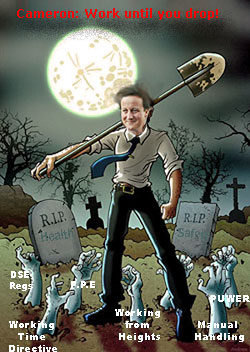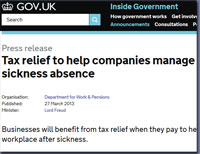Whilst the headline in the DWP press release on 27th May was not exactly as that above, their preferred wordage of ‘Tax relief to help companies manage sickness absence’ will be seen by majority of sick workers as meaning exactly the same!
 As previously reported by Unionsafety, this is the spectre of ATOS making millions of pounds in profit running a similar service to that being used by this Tory-led coalition government to remove disability benefits from those unable to work; on employees absent from work due to illness and injuries sustained at work.
As previously reported by Unionsafety, this is the spectre of ATOS making millions of pounds in profit running a similar service to that being used by this Tory-led coalition government to remove disability benefits from those unable to work; on employees absent from work due to illness and injuries sustained at work.
Also previously reported by Unionsafety, the new service is the Government response to the independent review of sickness absence led by Dame Carol Black and David Frost CBE.
Government claim it will provide occupational health advice to employees, employers and GPs on the support and interventions needed to help employees move from sickness absence back into the workplace.
But will it see ATOS advisers in GP surgeries telling patients and their GP’s what to do to ensure minimum sick absence irrespective of the health of the patient?
Whilst Trade union safety reps are fully aware of the huge cost to industry and the misery suffered by individuals and their families and the lost productivity due to sick absence caused by injuries at work; this government prefers to use the battering ram and cat of nine tails on ill employees, rather than putting into place preventative measures and insisting employers ensure their workplaces are healthy and safe. Insisting that workers only come back to work when fit to do so, is part of a system to maintain such healthy workplaces.
This latest government scheme of course will result in an even unhealthier working environment for the majority of the UK’s workforce, according to many within the health and safety and trade union communities; as workers are forced and coerced back to work prior to full recovery.
A study done in 2010 by The Work Foundation warned of the effects on productivity and levels of sick absence as a result of people working during bouts of sickness:
“As well as reporting a higher number of days’ sickness presence, employees who
perceived pressure from managers and colleagues to work when unwell were also
more likely to report that their performance was adversely affected by working when
unwell.”
And:
 “Employees who were unable to adjust their work around their health problem were also more likely to report that their performance was adversely affected by working unwell.”
“Employees who were unable to adjust their work around their health problem were also more likely to report that their performance was adversely affected by working unwell.”
A TUC survey that same year found:
* Within the last month, a fifth of the 2,003 respondents to the survey had been to work when they were really too ill to do so (21 per cent in the public sector and 19 per cent in the private sector).
*
A further one in three (36 per cent) had done so within the last year, though not in the last month.
* Only 13 per cent claimed they had never been into work when they were too ill to go.
* Within the last month, more females had gone into work when ill than males 23 per cent compared to 17 per cent). Younger people (aged 18-34) are also more likely to have gone in to work sick over the last month (24 per cent compared 23 per cent of 35-54 year olds, and 11 per cent of 55+ year olds).
The study concluded:
“Improving people’s working lives not only improves personal well-being but it can also lead to better, more successful organisations with loyal and motivated staff.
Factors that contribute to a better working environment include being in control of workload, good quality line managers, good health and safety standards, a friendly and flexible workplace culture, equality and fair treatment, development and training opportunities, sensible hours of work and manageable work intensity, job security and a healthy work-life balance culture."
Ignoring all this of course, the government claims that its new scheme will succeed because targeted tax relief will “….encourage employers to fund around 110,000 health-related interventions.”
 Under the scheme announced by Lord Freud, Minister for Welfare Reform, employers will receive tax relief on expenditure up to £500 on health treatment recommended by a new health and work assessment and advisory service to support employees to return to work after a period of sick absence. The new health and work assessment and advisory service will provide occupational health expertise to many small businesses for the first time.
Under the scheme announced by Lord Freud, Minister for Welfare Reform, employers will receive tax relief on expenditure up to £500 on health treatment recommended by a new health and work assessment and advisory service to support employees to return to work after a period of sick absence. The new health and work assessment and advisory service will provide occupational health expertise to many small businesses for the first time.
The Minister for Welfare Reform said:
“Over 130 million working days are lost to sickness absence and we need to stop people falling out of work and onto long-term sickness benefits.
The longer someone is out of the workplace, the harder it is for them to move back into work, but often fast intervention can stop people moving down that road.
The introduction of tax relief for interventions and the heath assessment and advisory service will help British business to hold on to their staff, help workers stay in work and cut the sickness benefit bill by up to £60million per year.”
The new service will provide an occupational health assessment after four weeks of sickness absence.
Following the assessment, the service will ensure individuals receive the most appropriate interventions, case management and follow-up support.
Of course many people understand fully what the government mean by ‘follow-up support’ – basically get back to work, and if you don’t we’ll bully you back!
In addition, the service will provide an advice service for employers, employees and GPs throughout the process.
It remains to be seen if, as the government claims, the health and work assessment and advisory service will:
* cut the sickness benefit bill by £30million - £60million per year
* cut sick pay costs to business by £80million - £165million a year
* increase economic output by £450million - £900million a year
* cost around £40 million a year
* be used by around 500,000 employees
The independent review and the Government’s response plus the two studies by the Work Foundation and the TUC are available from the E-Library Database of this website. Select ‘sick absence’ as the search category.
Source: DWP / Work Foundation / TUC / Unionsafety


 As previously reported by Unionsafety, this is the spectre of ATOS making millions of pounds in profit running a similar service to that being used by this Tory-led coalition government to remove disability benefits from those unable to work; on employees absent from work due to illness and injuries sustained at work.
As previously reported by Unionsafety, this is the spectre of ATOS making millions of pounds in profit running a similar service to that being used by this Tory-led coalition government to remove disability benefits from those unable to work; on employees absent from work due to illness and injuries sustained at work. “Employees who were unable to adjust their work around their health problem were also more likely to report that their performance was adversely affected by working unwell.”
“Employees who were unable to adjust their work around their health problem were also more likely to report that their performance was adversely affected by working unwell.” Under the scheme announced by Lord Freud, Minister for Welfare Reform, employers will receive tax relief on expenditure up to £500 on health treatment recommended by a new health and work assessment and advisory service to support employees to return to work after a period of sick absence. The new health and work assessment and advisory service will provide occupational health expertise to many small businesses for the first time.
Under the scheme announced by Lord Freud, Minister for Welfare Reform, employers will receive tax relief on expenditure up to £500 on health treatment recommended by a new health and work assessment and advisory service to support employees to return to work after a period of sick absence. The new health and work assessment and advisory service will provide occupational health expertise to many small businesses for the first time.